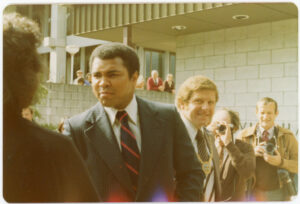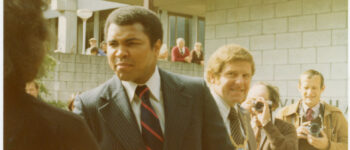1979: Muhammad Ali
February 23, 2025
By AHNZ
 Today in New Zealand history, 22 February, 1979, the champion US boxer Muhammad Ali visited this country.
Today in New Zealand history, 22 February, 1979, the champion US boxer Muhammad Ali visited this country.
Ali was 37yo and was still world heavyweight champion so a major celebrity had come to a land that seldom saw them. “Nine people out of 10 in the United States don’t know this place exists,” he said. “Like Columbus discovered America, I’ve discovered you.” Ref. NZ Herald (2016)
Alan Scaife of Heretaunga Boxing Club had taken his boxing students to Pennsylvania the year before to compete with Team Ali. An invitation to return the visit was accepted and Muhammad Ali came to Upper Hutt, then on to Auckland too. It was in this country that he announced his retirement from boxing although he would later, inadvisably, take it up again.
This high time in Ali’s career was also a golden era for New Zealand. It would continue with a visit and concert by Bob Marley in April. However, from mid-1979 things started going downhill for the country. The Haka Party Incident in May used violence to solve social problems. Feminists started attacking fatherhood and masculinity. And, a sobering national tragedy occurred when a government passenger plane killed hundreds by crashing into Antarctica’s Mt Erebus. Muhammad Ali was giving a closing era one of its last great moments but we didn’t know it.
“Ali had an amazing interview on the Sunday sports show hosted by Brendan Telfer; he looked like he didn’t want to be there but then Bob Jones – yes the politician – came up with stuff even Ali had forgotten; they chatted live on TV for probably 2 hours; alas some doofus at TVNZ wiped the tape” – Norman Burns, NZHNH, Facebook (2020)
“Wow a beautiful fitting in his last years of his boxing career” – Alasopa Siloata, ibid
“Met him in Cornwell park in Auckland in 1979 turned up in his limo with his kids and security we were allowed to shake his hand the man was huge and so gentle” – Grant Oliphant Stewart, ibid
“If the world could be like New Zealand, it would be a good place. The dark people here don’t seem to be mistreated. They don’t seem unhappy.” said Ali.
Muhammad Ali and Bob Marley served as supreme influences on Maori men by role modelling a path to supreme success from the pits of obscurity. This was the authentic version of today’s drive for DEI (Diversity, Equality, Inclusion) idea to plant people in roles to inspire others. When kids can see “people who look like they do” in a situation of success then a neural pathway is created for seeing oneself as successful also. It’s a cosmetic variation of what Anthony Hopkins’ character said in The Edge (1997:) What One Man Can Do Another Can Do.
For example, Brian Tamaki explained in an interview to Reality Check Radio’s Rodney Hide (2023) that his own charismatic persona had its roots in Ali via his uncle Colin. So Muhammad Ali was a sort of human tracer fire lighting the way for the Boomer generation to leave rural Maoriland and migrate to New Zealand and join Western Civilisation. Colin “…got it from watching a little TV with his brothers when Muhammad Ali was fighting. And Muhammad Ali is sitting and saying, ‘I am the greatest, I’m the prettiest on the planet, nobody’s faster than me.’ And I said, ‘Is that where you got it?’ He said, ‘Yep.’”
“And he said, ‘You know why, Brian? Because all around me I saw my brothers, my mother, and father, their heads hung down. And he said, ‘I didn’t want to live like that. I wanted to live so I was tall, proud, and that I could do anything and nobody could have it over me.’”
“I remember my mum saying, ‘Oh, you know, he talks too much.’ Because it’s not the Kiwi way, right? He brags and boasts, ‘I’m going to do this, and I’m going to do that.’ And she didn’t like that about him, but in hindsight, it was the greatest part of him.” – RCR (2023)
Brian Tamaki was also subject to the Marginal Insider Effect as his was an Anglo Zelandian family that married into Maori Zelandian via his father. The most zealous people in any social group tend to be those who are not fully of it in the first place. For example, Cassius Clay converted to Islam and changed his name to Muhammad Ali and so became one of its most prominent figures. Likewise, Bob Marley was the son of a white Jamaican of English descent but (or, therefore) Bob affected to be the most Afro-Jamaican of Afro-Jamaicans. You can see the same thing with country music stars who tend to be from cities, rappers who tend to be from wealth, or rockers and ‘everyman’ comedians who tend to come from elite private schools…
Anyhow, you can see how New Zealand is a Cultural Colony and that Muhammad Ali played a huge and personal role in shaping the way we see ourselves and do things here. He died in 2016 after years of living with the long term consequences of a battered life but even today the ripples of his mark on the world are being felt. For example, Ali would not have approved of the Woke identity confusion era of the 2020s and nor does Brian Tamaki and his Destiny Church when they resist it. Without The Greatest the there would be no Pastor of Muppets. The spirit of Ali is the most prominent voice holding the line and turning back the misguided Rainbow tide.
—
Image ref. Brenda Neville Collection, Upper Hutt City Library Heritage Collections
3 thoughts on "1979: Muhammad Ali"
Leave a Reply
 Like Comment Share
Like Comment Share






Great read, great observations!
Thanks for your article, just about forgotten about Ali, my guess is he enjoyed NZ as we were a happy bi culteral society then, in my view, compared to todays vitriol. I missed the Bob Jones 2 hour tape, who would wipe that, Boxing, NZ history seems deliberate.
Thanks guys; Your feedback is greatly valued